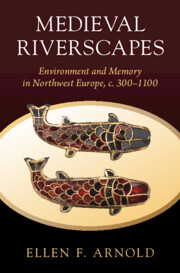
- Publisher:
- Cambridge University Press
- Online publication date:
- March 2024
- Print publication year:
- 2024
- Online ISBN:
- 9781009299381


Fishermen, monks, saints, and dragons met in medieval riverscapes; their interactions reveal a rich and complex world. Using religious narrative sources to evaluate the environmental mentalities of medieval communities, Ellen F. Arnold explores the cultural meanings applied to rivers over a broad span of time, ca. 300-1100 CE. Hagiographical material, poetry, charters, chronicles, and historiographical works are explored to examine the medieval environmental imaginations about rivers, and how storytelling and memory are connected to lived experiences in riverscapes. She argues that rivers provided unique opportunities for medieval communities to understand and respond to ecological and socio-cultural transformations, and to connect their ideas about the shared religious past to hopes about the future.
'As observers from Heraclitus to today’s flood managers know, rivers define the lands they flow through. In Ellen Arnold’s compelling narrative, ‘riverscapes’ reveal key environmental and cultural features of late antique and medieval Europe. Showing how river histories provide keys to future resilience, her book brings medieval environmental history into contemporary debates.'
Steve Mentz - Professor of English, St. John’s University, New York City, author of Ocean and An Introduction to the Blue Humanities
'There’s no ‘water under the bridge’ in Ellen Arnold’s new book, which shows how pre-modern writers preserved past flows into the present. Arnold opens a window for her readers onto both early medieval words and waters, illuminating northwestern Europe’s literary cultures, and their deep engagement with rivers.'
Paolo Squatriti - University of Michigan
'This admirable book immersed me totally into the real and imagined rivers and riverscapes of the Early Middle Ages. Arnold shows with tremendous skill and wonderful original texts how authors used the rivers and riverscapes as vehicles for literary, religious, and political messages; and how movement and transparency of rivers and their often blurred boundaries not only shaped human interaction but encouraged contemplation about change and transition, connections of spaces, and entanglement of past and present.'
Petra J. E. M. van Dam - VU University, Amsterdam
 Loading metrics...
Loading metrics...
* Views captured on Cambridge Core between #date#. This data will be updated every 24 hours.
Usage data cannot currently be displayed.